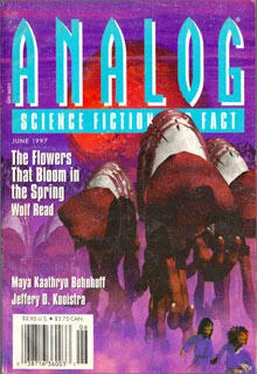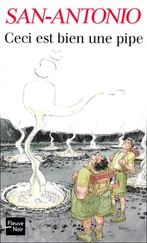Maya Bohnhoff - Pipe Dreams
Здесь есть возможность читать онлайн «Maya Bohnhoff - Pipe Dreams» весь текст электронной книги совершенно бесплатно (целиком полную версию без сокращений). В некоторых случаях можно слушать аудио, скачать через торрент в формате fb2 и присутствует краткое содержание. Год выпуска: 1997, Издательство: Dell Magazines, Жанр: Фантастика и фэнтези, на английском языке. Описание произведения, (предисловие) а так же отзывы посетителей доступны на портале библиотеки ЛибКат.
- Название:Pipe Dreams
- Автор:
- Издательство:Dell Magazines
- Жанр:
- Год:1997
- ISBN:нет данных
- Рейтинг книги:4 / 5. Голосов: 1
-
Избранное:Добавить в избранное
- Отзывы:
-
Ваша оценка:
- 80
- 1
- 2
- 3
- 4
- 5
Pipe Dreams: краткое содержание, описание и аннотация
Предлагаем к чтению аннотацию, описание, краткое содержание или предисловие (зависит от того, что написал сам автор книги «Pipe Dreams»). Если вы не нашли необходимую информацию о книге — напишите в комментариях, мы постараемся отыскать её.
than one…
Pipe Dreams — читать онлайн бесплатно полную книгу (весь текст) целиком
Ниже представлен текст книги, разбитый по страницам. Система сохранения места последней прочитанной страницы, позволяет с удобством читать онлайн бесплатно книгу «Pipe Dreams», без необходимости каждый раз заново искать на чём Вы остановились. Поставьте закладку, и сможете в любой момент перейти на страницу, на которой закончили чтение.
Интервал:
Закладка:
She sighed again, jiggling her udder.
The answer came to Beck with the sudden recollection of a story a colleague had told him about the strange combinations of words her students would produce during classroom exercises in a language class she had taught. He knew it was the answer—it was his dream, and his own memory had provided it. “Ambush two tangerines,” he said. Overhead, the final bar rolled into place and a loud bell sounded.
“Fuck it, I quit,” announced the cow, and disappeared along with the pink/blue sky, cotton candy clouds and clown-nose bushes. In their place the violently green sward sprouted a graveyard complete with ravens, crows, ornate listing headstones, and a gleaming white mortuary.
Beck was momentarily taken aback. Why a graveyard? He’d answered the riddle correctly; why this presentiment of doom? The place was eerie, but familiar, and he felt more memories pressing for release. He made his way to the mortuary.
The foyer was empty. He moved into a display room where a fleet of new caskets were arrayed, tops open like convertibles in a car lot. On the opposite side of the display room, he could see the steel-and-glass doors that led to the nether realms. He certainly hoped his dream journey wouldn’t take him there.
He turned and peered across the foyer. A chapel—the carved wooden doors bore a representation of the Solar System—nine planets arranged around the central Orb. Each planet was engraved with a religious symbol: a Star of David, a bowl of fire, a lotus, a cross, an Evam, a yin-yang, a five-pointed star, a star and crescent, a nine-pointed star. He moved to the door, put his hand on the handle and pulled. It was locked. He glanced at the Solar System again. The planets, with their religious symbols, were out of order. Another puzzle. After a moment of thought, Beck rearranged the planets in their engraved orbits—beginning with Mercury and its nine-pointed star, and ending with Pluto, bearing the Evam. Pluto. The ninth planet was Pluto. But it hadn’t been discovered when Holst wrote The Planets —the music he had heard on the turntable, he suddenly realized, was a symphonic rendition of the Mickey Mouse Club theme, music Beck had always associated with the immortal rodent and his dog. Nine planets, nine religious symbols, nine hoops, nine everything.
Teetering on the verge of recognition, Beck entered the chapel. At the altar in front of a closed and locked casket stood a clown in a black suit. He had blue hair, a tangerine nose and a pair of red, floppy shoes that looked incongruous with the natty attire. His face bore a half-mournful, half-manic expression. When he saw Beck, his bright red lips stretched into something that bore a closer resemblance to rigor mortis than a smile. He produced a clipboard out of the ether.
A manic-depressive clown, Beck thought. Oh great. Clowns had never amused him as a child. They had given him the willies. He now realized they still gave him the willies. He’d often thought they’d make ideal scarecrows—or rather “scarekids”—for people who had flower beds or pools they wanted to keep the neighbors’ progeny out of. He steeled himself and went to the altar to confront the clown-mortician.
“You are…?” the clown asked lugubriously.
“Beckett Hodge.”
“Beckett Hodge, you must answer four questions for me, before you may proceed.”
Beck nodded, not at all sure he wanted to proceed. Right now what he really wanted was to wake up, even if it meant having to go through the embarrassment of explaining to Laurence Bourbon and Zev Darren why he’d fallen asleep in the middle of a conversation.
“Listen carefully,” said the clown, “and finish this sentence.” He glanced down at the clipboard and read: “Touch not the cat—”
“But with a glove,” said Beck automatically.
The clown smiled and checked off something on his clipboard. At the foot of the casket, a latch popped open. Beck jumped.
“Now,” said the clown, “complete this: He was like a giant on dry land—”
“And… and like a silkie in the sea.” Another check mark was drawn, another latch popped open and an icy shaft of recognition speared Beck’s brain. He knew these sequences. And he knew them for reasons other than their association with childhood games or television shows he had watched.
“By the prickling of my thumbs,” the clown read.
Beck backed away from him. Memories had been converted to binary expressions and coded into a targeting series, and eight pattern-matching sequences.
“By the prickling of my thumbs,” the clown repeated.
Memories had built a nine-level security system for the DOD.
Beck turned and fled.
Behind him the clown said tonelessly: “Abort. Restart sequence. Touch not the cat—”
The graveyard metamorphosed as Beck crossed it, back into a meadow full of bluebirds, butterflies and tangerine bushes. The cow did not look up as he flew past her, but he thought he heard her say, “Abort. Reset.”
The meadow had faded by the time he reached the top of the staircase/ slide. It was still a slide. He threw himself down it, landing at the bottom on his behind. Scrambling to his feet, he confronted the corridor of tiles. Both sections of the course were now just ordinary-looking floors. He took them without so much as a hop, skip or jump and came out onto the giant turntable. It rolled away and to his right, inexorably. If he was where he thought he was, the situation demanded that he exit this scene just as he had entered it. While the eight pattern-matching segments of the program were reset upon completion or exit, the initial nine-layer “hacker trap” was not. It could be tripped as easily by a clumsy exit as it was by a clumsy entrance. Beck had no desire to find out what it meant to be caught by his own fail-safes.
He stepped out onto the turntable. Not content to let it simply carry him along, he trotted along with the rotation, eyes open for the hoops. His mind churned. How the hell could he be here? Was this a drug-induced dream, or was it more real than that? Was it being monitored? The image of Zev Darren playing a VR game in the corner of Bourbon’s suite came to him with the force of a blow. Could that be it? Could he literally be inside the DOD program? He had constructed the DOD scenes with specialized programming Gear—had seen them as programming objects. But interpreted by a VR system—provided one could be made compatible—with his own imagination in control….
He shook his head as if that might rattle some answers loose from the inside of his virtual skull. The Who and the Why were obvious, the How conceivable. The question was: what would prompt a fiction editor and an art director from a major publishing house to get involved in terrorism and espionage?
He hurried to the first basket of soccer balls and hurled one through a hoop before the Ghost routine could intercept him. Timing. This part of the program was all timing. He worried that he might do better if he didn’t know what those bright hoops and balls represented: clever traps and one-way viruses that would backwash into the inept hacker’s system—in this case, his mind. Beck chafed as he negotiated the nine hoop stations, returning at last to where he had entered the program.
The “Sheraton” stood alone on a barren corner, symbol of Beck’s connection with the real world—a world where Laurence Bourbon and Zev Darren waited for him to unlock the gates to hell.
He stood inside his own creation—a creation where virtual cows juggled tangerines and where manic clowns presided over coffins full of death—and pondered explosive things. What he needed was a break program that would shatter the external connection—a virtual bomb. He floundered for a moment, trying to decide how to create a bomb in this impossible universe. Then he laughed at himself. Impossible it might be, but it was his universe and ultimately obeyed his divine decree.
Читать дальшеИнтервал:
Закладка:
Похожие книги на «Pipe Dreams»
Представляем Вашему вниманию похожие книги на «Pipe Dreams» списком для выбора. Мы отобрали схожую по названию и смыслу литературу в надежде предоставить читателям больше вариантов отыскать новые, интересные, ещё непрочитанные произведения.
Обсуждение, отзывы о книге «Pipe Dreams» и просто собственные мнения читателей. Оставьте ваши комментарии, напишите, что Вы думаете о произведении, его смысле или главных героях. Укажите что конкретно понравилось, а что нет, и почему Вы так считаете.












